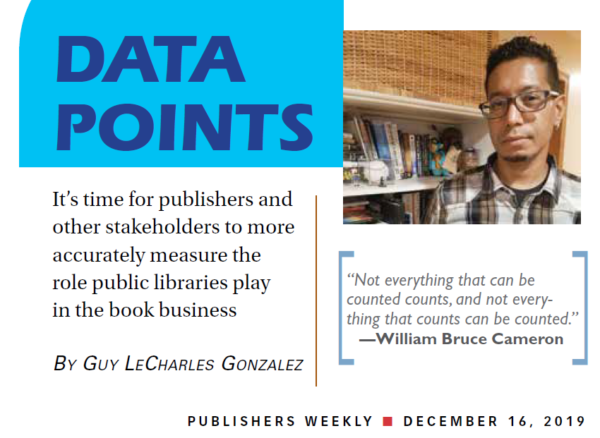Things have been a little quiet for me on the library front recently—periodic Twitter rants aside—as I’ve been working behind the scenes on refining the Panorama Project‘s focus for 2020 in light of recent events, identifying areas where we can have a measurable and actionable impact and figuring out how to implement the right initiatives.
Whether it’s NY Times bestselling authors whose books have sold less than an average monthly issue of a b-list superhero comic, or publishers declaring library lending is impacting their retail sales—one of the biggest obstacles is the lack of transparency when it comes to useful data, and the industry’s apparent comfort with it.
Compare the music and book sections of #TheSkyIsRising report and you’ll understand why publishing really isn’t a data-DRIVEN industry: there’s almost no reliable industry data, and Amazon likes it that way. https://t.co/d5eNyDbHG8
— Guy LeCharles Gonzalez (@glecharles) April 8, 2019
While I’m excited about what’s in development for 2020, it’s still too early to announce any of it, but two articles I wrote recently offer a glimpse of where things are heading:
Walkabout Northern California | Panorama Picks Regional Spotlight
I believe that one of the most useful aspects of Panorama Picks is the opportunity to look beyond obvious bestseller and/or celebrity-driven demand to identify books that are uniquely in-demand at public libraries in specific regions across the country, and this profile of a niche travel guide offers some insights for publishers, authors, and booksellers about libraries’ impact on discovery and retail sales.
Travel guides are a highly competitive category which has also been heavily disrupted by online offerings over the years. A search for “northern California hikes” on Amazon returns 183 results, and the same search on WorldCat returns 298. Meanwhile, the top 10 organic search results on Google are dominated by travel blogs and bloggers—only one of whom has their own books to sell.
At first glance, Walkabout Northern California may seem like an unusual ebook to find traction in libraries, but it is simply another example of the power of public libraries as a critical discovery channel.
Why It’s Time to Quantify the Library’s Role in the Reading Marketplace
It’s time for publishers and other stakeholders to more accurately measure the role public libraries play in the book business, and I wrote an op-ed for Publishers Weekly identifying three of the biggest known unknowns about libraries that are entirely knowable, if only there was a collective will to start shedding a productive light on them.
Data isn’t a panacea, of course. The fact that two contradictory perspectives can be sparked by similar data illustrates one of the important limitations of data: without proper context, it can be used to prove whatever you want it to. As in the early days of GPS navigation systems, reliance on data will drive you off a cliff if you’re not also paying close attention to your surroundings.
I’m particularly proud of this one, and extremely thankful for the invaluable feedback I got from several colleagues to help shape it, as well as Andrew Albanese’s excellent edits to tighten it up and make it ready for prime time. And I’ll never not be thrilled about seeing my byline in print!
PS: I’ll be representing the Panorama Project at PubWest in February, speaking on a keynote panel: “Ensuring a More Literate Future for All.” It will be my first time attending the conference, one I’ve heard great things about over the years, as well as my first visit to Portland, OR. If you’ll be attending or are in that area, let me know ahead of time!
Do you like email?
Sign up here to get my bi-weekly "newsletter" and/or receive every new blog post delivered right to your inbox. (Burner emails are fine. I get it!)


